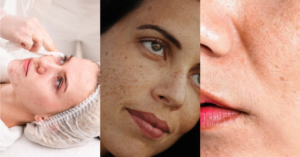Aesthetics
Weight Loss vs Fat Loss: Differences & Tips From A Doctor
Did you know about the differences between weight loss and fat loss?
By: Farah Khan / March 8, 2023

The abundance of available online information concerning weight loss, fat loss and dieting can be confusing. Dubious articles with titles like “500 Calorie Daily Diets” and “Lose 10kg in a Week” certainly do not help the cause. It can be daunting, and to the uninitiated, all the information may cause confusion.
To help sift out facts from myths, read what Dr Ivan Puah, Medical Director of Amaris B. Clinic and an accredited liposuction doctor in Singapore, advises.
Disclaimer: The Beauty Insider platform does not promote or support any specific treatment. The information provided in this article is for educational purposes only, and we strongly advise all readers to thoroughly research and consult with a doctor accredited by the Ministry of Health before undergoing any aesthetic or medical procedures.
Contents
What is the cause of weight gain and obesity?
Being overweight and obese are not caused by ONE single factor. There are a lot of misconceptions about this.
“An overweight person is often viewed as lacking the discipline and willpower to ‘eat less and exercise more’. In reality, it is more complicated. The weight gain that leads to obesity is often a chronic, relapsing disorder due to multiple factors. These include genetics, behavioural, psychological, environmental, medical and others,” explains Dr Ivan Puah, who also holds a Graduate Diploma in Sports Medicine. Dr Puah has over 20 years of clinical experience treating people with weight problems.
While an individual’s effort is critical in weight management, other factors include family, social, health services and public policy. A strong, supportive unit is essential for someone on a weight loss journey.
What Happens When We Lose Weight?
Tightly regulated by complex systems, our body’s fat cells store excess energy for survival. Under normal, stable circumstances, the body regulates metabolic responses to maintain a stable weight, like it regulates body temperature or blood pressure.
Dr Puah shares, “It is believed that the body appears to have a ‘set point’ for body weight. Any deviation triggers a compensatory response in the opposite direction to restore the ‘setpoint’. For example, in response to weight loss, energy expenditure is reduced accordingly to resist further loss. This allows the ‘set point’ to be restored. Weight regain after weight loss may be a physiological response rather than a failure of conscious effort.”
For some people, the resistance to weight loss can persist for years in the face of weight gain. This, unfortunately, predisposes them to excessive weight gain in the future.
Does Counting Calories Work?
Dr Ivan Puah shares that a one-size-fits-all solution for weight loss doesn’t exist. “I adopt a fact-based and science-based system so patients can achieve results safely and effectively. Dietary changes or medical intervention alone are not enough for successful weight loss. You also need to incorporate exercise. I recommend at least 150 to 300 minutes of moderate activity per week, with resistance training at least twice weekly.”
Studies have shown that exercise alone rarely results in more than 3% weight loss, while diet and exercise can result in 5% to 15% weight loss.
The Amaris B. Weight Loss & Management Program is multi-pronged. It includes dietary modification, personalised nutrition counselling, and fitness recommendations. Dr Ivan Puah will also prescribe medications to help patients suppress the neuroendocrine pathway for more sustainable weight loss. Throughout the programme, patients will be closely monitored.
What is your opinion on popular diets?
“There are many diets, including low-fat, low-carb, and even special diets focused on eating patterns like DASH, Mediterranean, Intermittent Energy Restriction, Paleo, and many others. “However,” explains Dr Ivan Puah, “studies have failed to prove the long-term superiority of one diet over another.”
What happens when the body loses weight?
When the body loses weight, it loses muscle mass and fat. To minimise muscle loss, an adequate intake of protein in the diet and incorporating resistance exercise will be necessary.
Why can’t we get rid of the fat on our hips and thighs even though we’ve lost weight?
Due to genetics and other variable factors, it is unlikely that specific areas can achieve targeted FAT LOSS. For example, a person with a predisposed “saddlebag” or excess fat at the belly or waist will retain such body contour even after significant weight loss.
Surgical treatment such as liposuction targeting localised fat may benefit those with problems with disproportionate body shape or with stubborn layers of fat in certain body areas despite weight loss.
While liposuction is not a weight loss procedure, it is a very effective way to permanently remove excess fat from unwanted areas. It also allows one to change one’s body contours and appearance and helps improve one’s body confidence.
Liposuction permanently removes stubborn and excess subcutaneous fat for slimmer and improved facial and body contours. Fat can be removed from the face, arms, armpits, male chest, back, abdomen, waist, hips, thighs, knees, and calves.
Amaris B. Clinic: Weight Loss Management & Body Contouring All Under One Roof
Dr Ivan Puah has over 20 years of clinical experience treating people with weight issues. He understands that the primary motivation for this group of patients is to improve their overall health, reduce the risk of chronic disease, increase self-confidence, and improve their quality of life.
Dr Puah and his team offer a comprehensive suite of programs to support patients in reaching their weight goals. Losing weight, however, is a process and can be stressful. In addition to medical intervention, exercise and nutritional counselling, Amaris B. Clinic offers clinical massage, myotherapy, and lymphatic drainage massage to support the individual’s weight loss objective.
Once the weight loss goal is achieved, the individual’s physique can be reshaped and toned with Vaser Liposuction. Vaser Liposuction, an ultrasound-assisted liposuction technique, removes stubborn facial and body fat that cannot budge with diet and exercise.
Although not meant for weight loss, Vaser Liposuction is an effective, safe, and permanent solution for correcting body proportion. It uses ultrasound energy to liquefy unwanted fat into a “buttery consistency” while leaving vital connective tissue such as muscle and blood vessels relatively untouched. The liquefied fat is then removed by suction. When performed by a skilled and experienced liposuction doctor, Vaser liposuction can create muscle definition, making it an enticing option for those unable to achieve the physique they aspire to.
For more information on weight loss and management or surgical body contouring procedures such as liposuction, Vaser liposuction, Laserlipolysis (Laser Liposuction) or 4D Liposuction (Hi-definition Lipo), contact Amaris B. Clinic at 65364211 or Whatsapp 91524140.
















